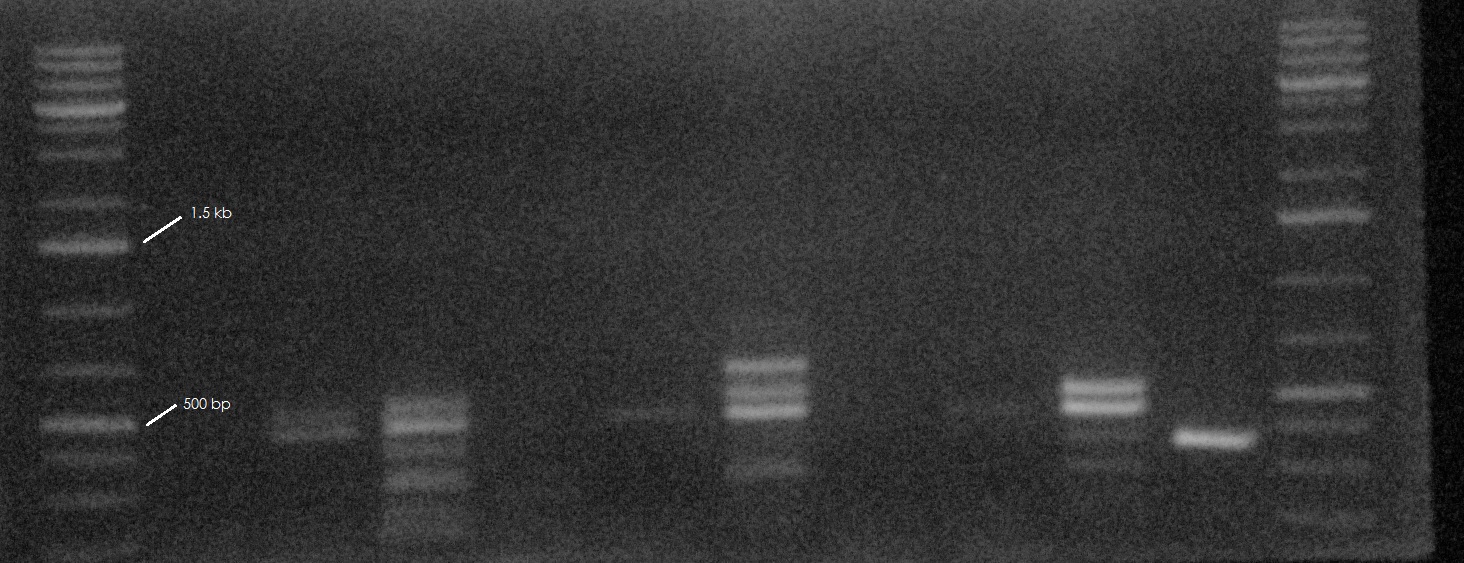Team:Evry/Notebook/Transposons/16.10.14
From 2014.igem.org
| (6 intermediate revisions not shown) | |||
| Line 8: | Line 8: | ||
<br> | <br> | ||
| - | <h4> | + | <h4> Trying to show BBa_1413044 work even empty in DH5alpha </h4> |
<br><br><p> | <br><br><p> | ||
8 colonies of DH5alpha were transformed with BBa_1413044 and grown in 3 ml LB + 2 negative control | 8 colonies of DH5alpha were transformed with BBa_1413044 and grown in 3 ml LB + 2 negative control | ||
| Line 18: | Line 18: | ||
PCR: enzyme: Q5; template: 3 ul of supernatent for the culture; oligo: F 100/ R 101; Tm tested: 55; elongation time: 1m00s | PCR: enzyme: Q5; template: 3 ul of supernatent for the culture; oligo: F 100/ R 101; Tm tested: 55; elongation time: 1m00s | ||
<br><br></p> | <br><br></p> | ||
| - | <div align="center"> | + | |
| - | <img src="https://static.igem.org/mediawiki/2014/b/b9/Evry_Is_ecoli.JPG" width="50%"/></div> | + | <div align="center"><img src="https://static.igem.org/mediawiki/2014/b/b9/Evry_Is_ecoli.JPG" width="50%"/></div> |
| + | <br><br> | ||
| + | The two last wells are the controls which surprisingly displayed a band, and we did not obtain a single band for the 8 strains. | ||
| + | In the end the gel revealed itself to be inconclusive with regards an empty transposon vector. | ||
<br><br> | <br><br> | ||
| - | <h4> | + | <h4> Defining where the transposase integrate </h4> |
<br><br><p> | <br><br><p> | ||
find enzyme with a good cut numbers in the genome and not in our insert: HindIII | find enzyme with a good cut numbers in the genome and not in our insert: HindIII | ||
| Line 39: | Line 42: | ||
</p> | </p> | ||
<br><br> | <br><br> | ||
| - | |||
| - | |||
| + | <div align="center"><img src="https://static.igem.org/mediawiki/2014/a/af/Evry_Genome_cut_religated.JPG" width="50%"/></div> | ||
| + | <br><br> | ||
| + | |||
| + | <p>One clone clearly displayed numerous insertions, while the others having fewer bands tend to show band sof the same size, which could prefigure the existence of favourite spot, as can be seen in E.coli. | ||
| + | <br><br> | ||
| + | With further experiments and sequencing run we will be able to precisely locate the insertions and the better define how many times an insertion event can occur at a given concentration of plasmid electroporated.</p> | ||
<span class="cd-date">Oct 16</span> | <span class="cd-date">Oct 16</span> | ||
Latest revision as of 03:27, 18 October 2014

Trying to show BBa_1413044 work even empty in DH5alpha
8 colonies of DH5alpha were transformed with BBa_1413044 and grown in 3 ml LB + 2 negative control
Preparation for PCR colony:
Spin down 500 ul culture at 14000 g - 2 min, resuspend in 100 ul H20 MilliQ, put at 95 C° for 10 min then spin down at 14000 g - 2 min.
PCR: enzyme: Q5; template: 3 ul of supernatent for the culture; oligo: F 100/ R 101; Tm tested: 55; elongation time: 1m00s

The two last wells are the controls which surprisingly displayed a band, and we did not obtain a single band for the 8 strains. In the end the gel revealed itself to be inconclusive with regards an empty transposon vector.
Defining where the transposase integrate
find enzyme with a good cut numbers in the genome and not in our insert: HindIII
Digestion of 8 Pseudovibrio denitrificans DNA preparation by HindIII
50ul final volume, 200 ng DNA preparation, 5 ul Neb 2.1 buffer, 38 ul H2O, 1 ul HindIII. 1h
Then religate:
Ligation: 20 ul final volume, 2 ul 10x T4 ligase buffer, 1 ul T4
then light digestion with XbaI
50ul final volume, 20 ul DNA religated preparation, 5 ul Neb 2.1 buffer, 38 ul H2O, 1 ul XbaI enzyme. 15 min
deactivation at 80 C° for 20 min
then PCR
PCR: enzyme: Q5; template: 3 ul of digestion by XbaI; oligo: F 105/ R 106; Tm tested: 55; elongation time: 4m00s

One clone clearly displayed numerous insertions, while the others having fewer bands tend to show band sof the same size, which could prefigure the existence of favourite spot, as can be seen in E.coli.
With further experiments and sequencing run we will be able to precisely locate the insertions and the better define how many times an insertion event can occur at a given concentration of plasmid electroporated.
 "
"